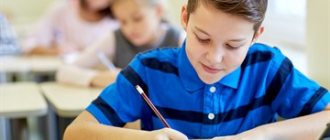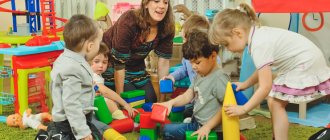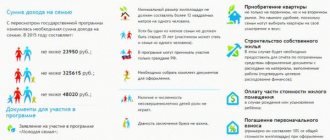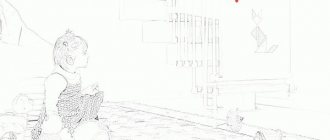On the topic: methodological developments, presentations and notes
A selection of poems and songs for the Seven-Colored Family competition”, in the “Business Card” category.
Script for the competition “Family of the Year” (Kamenev family 3rd grade “A”).
Labor education of a child in a large family.
This development may be useful for educational methodologists, teachers, music directors for the purpose of organizing an event dedicated to the beginning of the school year.
The subject of the study is the peculiarities of raising primary schoolchildren in a large family. The purpose of the study is to identify the features of the process.
This “blank” will help teachers in preparing documentation.
A positive testimonial for a 1st grade student from a large family.
Middle child
There are two options for the development of events : either the average child will completely lose interest in books for a long time, deciding that it is completely uninteresting. He can misbehave, interfere and behave violently. Or he will quietly leave at the moment when the parents are about to read.
Strengths and advantages of the middle child: From the moment when the middle child ceased to be the youngest, several roles were added to his psychological “role range”. The middle child has the widest range of roles. The middle one is at the same time an older brother to the younger one and a younger brother to the older one. In a future independent life, a child who was average in his family can quite well establish “bottom-up” relationships, “top-down” relationships, and “equal” relationships. The social intelligence of the average child is usually quite high. He knows how to understand people and get along with them. And it is people who grew up as average who often choose professions related to the social sphere. The middle child is not inclined to tough leadership - this is the lot of the first-born. And at the same time, he knows how to lead. He takes into account the experience of the older child and tries not to repeat his social mistakes. If the situation in the family is such that the middle child never got the responsible “sections” of work, since they were taken over by the eldest child, he may have problems making decisions and organizing his own life. Don’t miss the moment when it’s time for the middle child to be trusted to do something for others and decide something. “When they forget about you, you can do whatever you want, not like the elder, whom mom watches like a hidden video camera” - these are the real words of the middle child. BUT is it good if a child waits until they forget about him? They will forget for a while, and will not send you to look after the baby or help with the housework...
This is interesting: What is required at the birth of 3 children in Bashkiria
Pedagogical characteristics of the family
Nina Cheremisova
Pedagogical characteristics of the family
PEDAGOGICAL
FAMILY CHARACTERISTICS
Family composition : complete (mother, father, daughter)
Members' education: mother - secondary vocational education
father - higher professional education
There was no family breakdown .
2. The family has trusting , friendly relationships. The family is stable .
3. The main causes of quarrels and conflicts in the family are of a domestic and economic nature .
4. The nature of relationships in the family between adult family : harmonious, compromise.
5. The nature of the relationship between parents and other adult family members and the child : caring, friendship, trust, equality.
6. Position of the child in the family : the child takes pedagogically justified position
7. The child’s attitude towards his parents: how he understands and experiences his position in the family : he values the family , the parents are authorities for the child.
8. None of the family has an adverse influence on the child.
9. The father enjoys great authority in the family , because he is the breadwinner of the family and solves problems that arise.
10. Parents have a sufficient level of pedagogical knowledge and use different methods of pedagogical influence . They are not very demanding of the child.
11. Family : full family .
12. Family education style: harmonious.
13. Parents’ attitude towards the child’s activities in the field of:
Education: parents monitor the child’s education, engage in his education, and develop positive skills.
Labor: parents guide the child, teach him to clean, to work, and instill self-care skills.
Leisure: parents organize leisure activities (entertainment, holidays, alleys, parks)
.
14. Conclusions and recommendations:
Parents have no difficulties communicating with the child, support him in new endeavors, are involved in his education, and there are some economic difficulties.
Psychological and pedagogical characteristics of a left-handed child. Preparing a left-handed child to master graphic skills MBOU “Elementary school – kindergarten No. 1 of compensatory type” Consultation for parents on the topic: “Psychological and pedagogical characteristics.
Report at the teachers' council "Clinical, psychological and pedagogical characteristics of persons with autism and autistic personality traits" Municipal educational institution for students with disabilities "Bolshekrutovo boarding school."
Characteristics of the family PEDAGOGICAL CHARACTERISTICS OF THE FEDOROV FAMILY 1. Composition of the family, education of its members, whether there was a breakdown of the family: mother, father, son, youngest.
Information for parents “Psychological and pedagogical characteristics of children of senior preschool age” Preschool childhood is an important period in the mental and personal development of a child. In domestic psychology and pedagogy they distinguish.
Pedagogical characteristics for a preschool child at PMPK (sample) Description: This material will be useful for teachers of preschool institutions. Pedagogical characteristics for a preschool child.
Pedagogical characteristics for a child attending a preschool institution Pedagogical characteristics for a child attending a preschool institution. 1. Vika Fursova, born 02/07/2010. 2. Attends.
Long-term plan “Psychological and pedagogical support for family educational initiatives” Month Topic Goal Content of joint activities with children Content of joint activities with parents Material and equipment Interaction.
Psychological and pedagogical characteristics of the Municipal budgetary preschool educational institution Kindergarten “Island”. Psychological and pedagogical characteristics on.
Psychological and pedagogical characteristics of a preschooler Psychological and pedagogical characteristics of the child Name of the institution: Date of birth: Address of child registration and actual residence:.
Article “Pedagogical culture of the family” “Raising children is the most important area of our lives. Our children are the future citizens of our country and citizens of the world. They will make history."
Characteristics of the student’s family
The boy, born in 2021, is being raised in a full, low-income family. (The parents are not married, but live together, the children bear the mother’s surname). Mom, Zanina Olga Nikolaevna, does not have a permanent job. Temporarily works in the fields, in a bakery. Father, Sergei Igorevich Kan, receives a pension for caring for a disabled child. The boy lives in a three-room apartment, where the child is given a separate room, together with his mother, father and two brothers (5 people in total).
This is interesting: Is there an additional payment for the teacher category?
The family can be classified as a family with unstable, low material income. This is due to the seasonality of parents' work. But, nevertheless, the child is provided with the necessary clothing, textbooks, and has money for lunch in the canteen. The psychological situation in the family is stable. Parents spend enough time with the child, the mother supervises homework. Sasha improved his performance in some subjects, namely algebra, geography, and history. Mom, Olga Nikolaevna, regularly attends parent-teacher meetings and monitors the child’s interest in learning. Close contact has been established with the class teacher, subject teachers, social pedagogue and school psychologist. Olga Nikolaevna reacts adequately to teachers’ comments and recommendations. Preventive conversations are regularly held with parents. The family is visited by a class teacher, a social teacher, and a psychologist. The family is provided with psychological assistance. While working with the family, positive changes occurred.
Award system for large families
The award system is formed in accordance with the decrees of the President of the Russian Federation.
Main awards for large families:
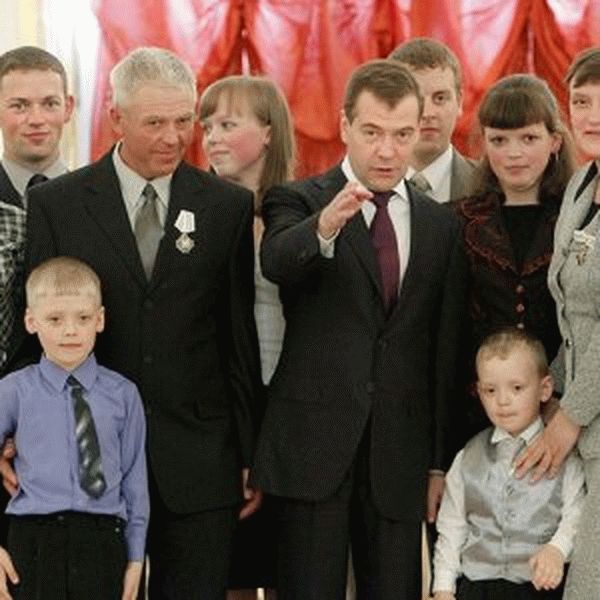
Awarding a large family
- Order of "Parental Glory", approved by the Government of the Russian Federation. The specifics of its presentation are determined by presidential decree. Both the mother and the father can receive it, unlike the previously awarded “Order of Maternal Glory.” The number of awards is limited and determined by competitive selection. Additionally, the recipient becomes a labor veteran and receives a one-time cash payment and a number of benefits. This order is issued when the number of children is at least 7 (children, both natural and adopted, are taken into account) provided there is a complete family.
- Order of "Maternal Glory" for Moscow residents raising at least 5 children.
- Medal "Parental Glory" for raising at least 4 children.
- Additional medals developed by individual regions.
The presentation of awards is regulated by the USZN (social protection authorities). In addition to the application and a number of documents, you should provide a reference.
In addition to orders and medals, there are various awards for participation in competitions (excursions, certificates, trips). In this case, the characteristics are provided by educational institutions.
Rules for compiling characteristics
The characteristics provide truthful, meaningful information about each member of the social unit. An important criterion is objectivity. To ensure the reliability of the data, the following measures are practiced:
- family visit with the participation of representatives of the parent committee, social and psychological services
- Conducting interviews with family members
- studying the psychological family climate, its influence on the development of children
- study of living conditions taking into account the material component
An exact template for the characteristics is not presented; its form may vary, but the principles of compilation are general.
Approximate characteristics diagram:
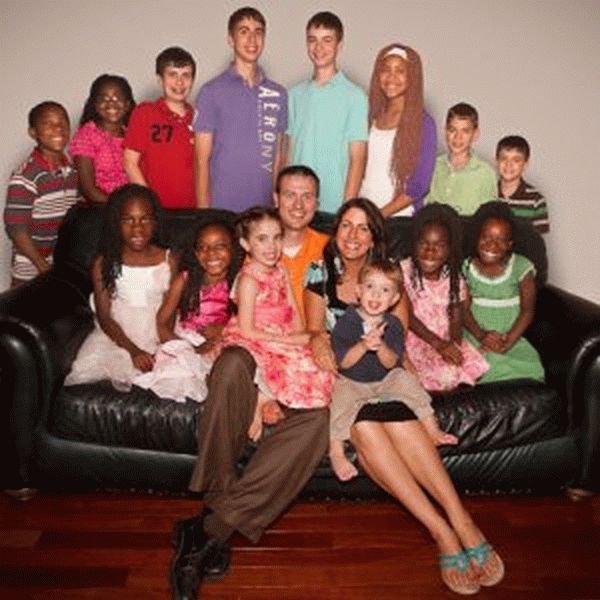
- Social status: plump, with many children, socially stable.
- The composition (structure) of the characterized family – in brief.
- Place of residence, registration.
- Characteristics of living conditions: level of sanitary conditions, availability of personal space and workspace for each child.
- Characteristics of material support: provision of children with everything they need.
- The level of educational and educational work of parents: the nature of the relationship, the consistency of the distribution of functions, the degree of attention to maintaining health and additional education.
- Assessment of the psychological climate, stability of control.
- Providing communication with public organizations and children's educational institutions.
- Participation in competitions, exhibitions of various levels, availability of incentives and awards.
When characterizing each individual family member, the following are indicated: degree of relationship, date of birth, education, workplace and position.
Family research methods
Research methods allow you to obtain more complete and reliable information:
- observation
- conversation
- diagnostic procedures (questionnaires, etc.)
- visits to the bosom of the family, as well as to places of study and work
- survey of colleagues, teachers, acquaintances
It is important to characterize the family as socially responsible, noting the following facts:
- ensuring a healthy lifestyle
- raising children by parents using their own positive example
- caring for the health of each family member
- organization of comprehensive harmonious development of children: spiritual, physical, moral
The characteristics must be specific, objective, supported by facts.
Social characteristics of the family
The social and psychological characteristics of the child’s family are the most important and massive part of the entire document. Social characteristics of the family include:
- Status: full-time, part-time, with many children or with one child, information about adoption or guardianship of the child.
- Financial security of the family: how stable is the income, what factors does it depend on (payment of alimony, seasonal work, unemployment or disability of family members), does the child have pocket money, how well is he provided with necessary things (food, clothing, school supplies), is he experiencing family financial difficulties, how financial status affects the psychological climate in the family (satisfaction, feelings of inferiority, conflicts).
- Social stability/instability of the family, tendency to addiction (alcohol, drugs, gambling) or crime.
- Distribution of responsibilities and main functions (household, financial, emotional-therapeutic, educational, etc.).
- Who has the formal or actual role in raising a child? It may not necessarily be performed by the same people. For example, parents working abroad are formally the educators of their child, but in fact these functions are performed by another relative (grandmother, grandfather), who is in close proximity to the child.
This is also important to know:
Characteristics of a student: sample
Example of characteristics of a large family
Characteristics of the large Solomin family for awarding the “Parental Glory” medal
Social status: complete family with many children, socially stable.
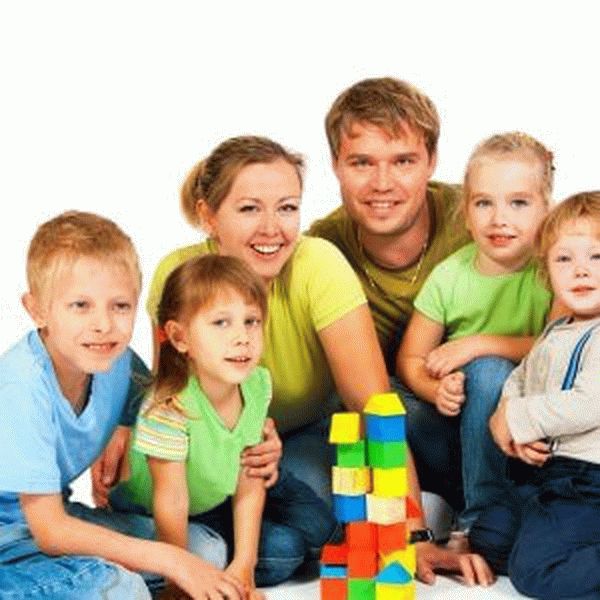
Family of 6
- Father: Solomin Ivan Georgievich, born in 1982, higher pedagogical education, mathematics teacher at secondary school No. 7 in the city of N.
- Mother: Solomina Zinaida Vasilievna, born in 1987, higher pedagogical education, primary school teacher at secondary school No. 7 in the city of N.
- Daughter: Solomina Lyudmila Ivanovna, born in 2006, 5th grade student at school No. 7 in the city of N. Hobby: children's theater.
- Son: Vladimir Ivanovich Solomin, born in 2008, 3rd grade student at school No. 7 in the city of N. Hobby: hockey.
- Daughter: Alexandra Ivanovna Solomina, born in 2011, student of the preparatory group of kindergarten No. 26. Hobby: dancing.
- Son: Solomin Yuri Ivanovich, born in 2012, student of the middle group of kindergarten No. 26. Hobby: hockey.
Place of family registration: N. city, Sovetskaya street, house 4.
Place of actual residence: at the place of registration.
Characteristics of living conditions
The family lives in their own house with an area of 112 m2. The number of rooms is sufficient. Children of different sexes have separate rooms. 2 sisters are located in one of the rooms, 2 brothers - in the other. The parents have a separate room. The premises have all the necessary furniture, appliances, and household items. For children there are workplaces with the necessary supplies, a play corner, and sleeping places. The sanitary condition of the home meets the standards.
Material support
Family members are provided with everything they need: clothing, educational and educational supplies, toys, books. The living room has a sports corner with a fitness machine. There is a sufficient supply of products.
Upbringing and education in the family
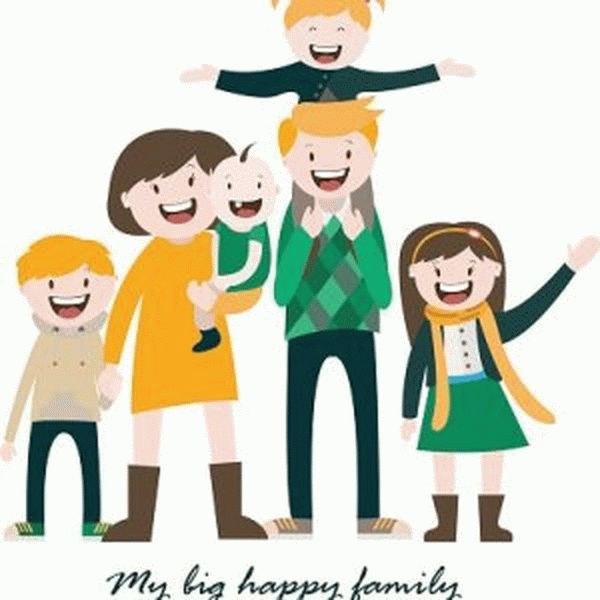
Warm family relationships
The family is morally stable, the relationships between its members are warm and friendly. The parenting style is democratic. The unity of requirements is observed, exactingness is combined with care and affection.
Children are well-groomed and tidy, they feel protected and loved. Everyone knows and talks about their functions. The regime and established rules of behavior at home are observed. Children, especially schoolchildren, are included in active work. Everyone receives additional education according to their interests.
Psychological climate
There is a sense of stability in everything. The test results confirm that love and mutual understanding reign in the family, and there are practically no grievances or conflict situations. When they arise, parents know how to quickly stabilize the situation.
Older children know how to give in to younger ones. Children love and respect their parents and try to be like them. All family members are distinguished by hospitality, kindness and politeness.
Connection with society
Parents take an active part in the affairs of the school and kindergarten that their children attend. Moreover, parents work themselves at the school their children attend. Teachers, they are well versed in child psychology. The family is a member of the city’s public organization “Friends of the Library” and participates in the work of local media.
Positive characteristics for a family: sample
- indicate the personal information of each member. For example: father - Sidoro in Alexander Konstantinovich, age - 39 years, education - higher (economics). Mother - Sidorova Natalya Leonidovna, Age - 37 years old, specialized secondary education. Son - Sidorov Alexey Alexandrovich, age - 14 years old, education - studying at school;
- describe the structure (functions of security, stability, open family or hidden, spiritual and moral side of family members, leisure and recreational functions);
- the next point is the psychological climate and psychotype compatibility of its members, i.e. the character, temperament, positive and negative aspects of each member;
- determination of the parental position, in which the goals of adult family members, problems in achieving them (indicating ways to solve them) should be disclosed. This stage is considered one of the main ones in the process of characterization;
- In the final part of the compilation, the behavior and position of the child (children) in the family plays an important role. His degree of trust in adults (parents), goals and aspirations, ways of realizing them, his success as a student and general psychological state of health are clearly noted.
- Observe the family, conduct personal conversations with each of its members, make visits and record the results of the work done.
- Availability of family law.
- Reviews about each of the parents from teachers (they should tell in detail about the life of each of the pupils) about the attitude of the family towards the child (children) and whether the parents cope with their responsibilities.
- Other opinions.
This is interesting: What does a Dominican passport give to a Russian?
